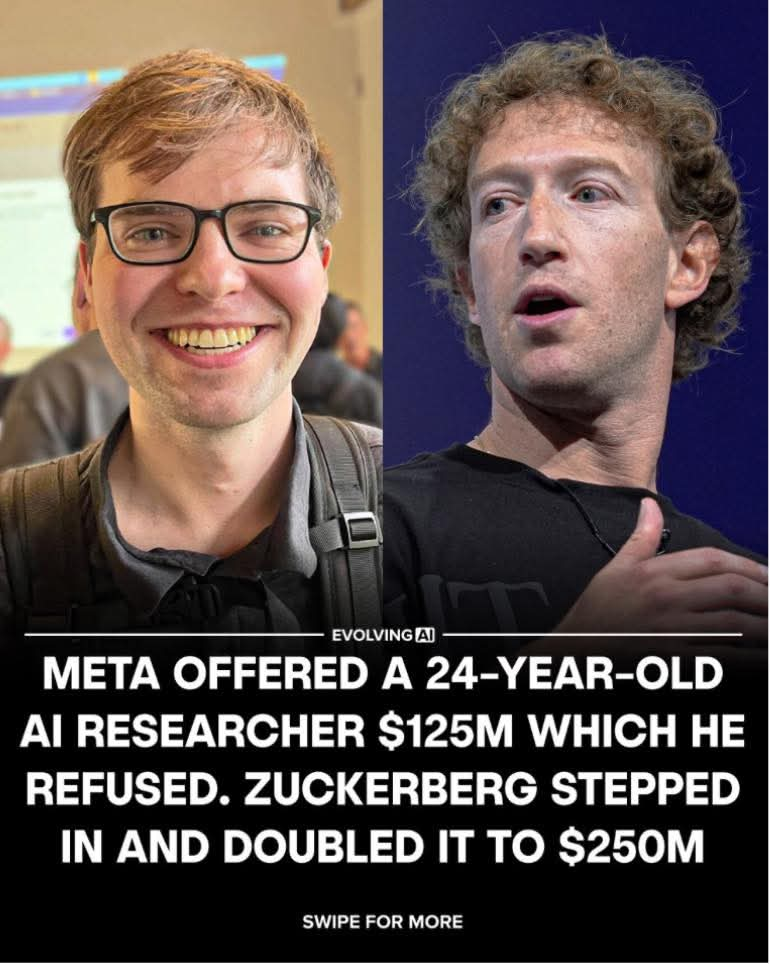Meta AI Recruitment: $250M Deal for Matt Deitke Signals Talent War Escalation
AiVantage Newsletter
Archives
Meta AI Recruitment: $250M Deal for Matt Deitke Signals Talent War Escalation
SIGN UP FOR OUR NEWSLETTER
Meta's $250 Million AI Gamble: The Making of Silicon Valley's Richest 24-Year-Old |
Tech Giant Doubles Down on Talent War, Paying Record-Breaking Package to Secure Matt Deitke After Initial Rejection |

Felipe Martinez
Aug 5, 2025
Mark Zuckerberg's aggressive pursuit of Matt Deitke reveals the unprecedented stakes in today's artificial intelligence talent wars.
The 24-year-old researcher initially dismissed Meta's low-ball offer of $125 million over four years before accepting a doubled deal worth approximately $250 million.
This staggering compensation package positions Deitke among the highest-paid employees in corporate history, reflecting Meta's broader strategy of spending over $1 billion to assemble an all-star AI team.
Deitke's journey from doctoral dropout to tech millionaire began at Seattle's Allen Institute for Artificial Intelligence, where he developed Molmo, a multimodal chatbot capable of processing images, sounds, and text.
His groundbreaking work on 3D datasets and embodied AI environments earned him an Outstanding Paper Award at NeurIPS 2022, one of AI research's highest honors awarded to only a dozen researchers among 10,000+ submissions.
In November, Deitke co-founded Vercept, a startup focused on autonomous AI agents, raising $16.5 million from investors including former Google CEO Eric Schmidt.
Meta's unprecedented spending spree extends far beyond Deitke, with the company's projected 2025 capital expenditures reaching $72 billion—a $30 billion jump from 2024.
The talent acquisition blitz includes luring Ruoming Pang, former head of Apple's AI models team, with a compensation package reportedly worth more than $200 million.
The global tech talent shortage has created a highly competitive landscape where skilled professionals command premium salaries, particularly in artificial intelligence and machine learning roles.
According to recent industry reports, 76% of organizations cite a severe shortage of AI-skilled personnel, driving compensation packages to unprecedented levels.
MIT economist David Autor captured the moment perfectly: When computer scientists are paid like professional athletes, we have reached the climax of Revenge of the Nerds.
Critics argue that mega-deals like Deitke's deepen economic inequality while accelerating job automation, with studies suggesting 25% of U.S. jobs could be automated by AI within 20 years.
The irony remains stark: Meta laid off 10,000 workers in early 2025, including content moderators and support staff—many replaced by AI systems—while simultaneously paying record sums for elite researchers.
The biggest tech players are pulling away in AI talent acquisition, creating a two-tier market where generative AI's rise has added rocket fuel to an already competitive field.
Deitke's landmark deal includes the potential for $100 million to be paid in the first year alone as he joins Meta's elite Superintelligence Lab.
The recruitment war extends beyond Silicon Valley, with governments and startups scrambling to compete for the same limited pool of AI expertise that could define the next decade of technological advancement. |
